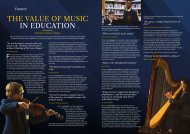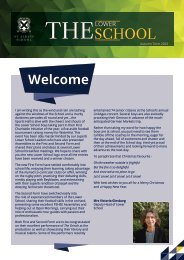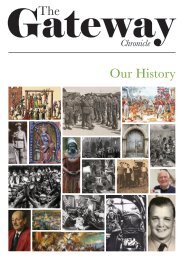Create successful ePaper yourself
Turn your PDF publications into a flip-book with our unique Google optimized e-Paper software.
54<br />
be forced to acknowledge the important<br />
social role that religion now played.<br />
<strong>The</strong>n Napoleon Bonaparte entered the picture.<br />
Coming to power in 1799, he was<br />
willing to permit the continuation of religious<br />
practice in order to both promote<br />
moral social values and to diminish counter-revolutionary<br />
spirit. He even recognised,<br />
despite this somewhat going<br />
against the separation of Church and<br />
state, that having religious congregations<br />
running hospitals and schools would have<br />
great financial benefits for the government.<br />
Most importantly, he saw that by<br />
repairing relations with the Church, he<br />
could use it as a means by which to consolidate<br />
his power. Thus, despite protests<br />
from avid revolutionaries within his government,<br />
Napoleon sought to formalise<br />
the place of the<br />
Church in France. On<br />
16 July 1801, he<br />
signed the Concordat<br />
with Rome after an 8-<br />
month negotiation period.<br />
This recognised<br />
Catholicism as the ‘religion<br />
of the vast majority<br />
of French citizens’, rather than giving<br />
the Church any unique role within the<br />
French state, whilst also requiring the<br />
Church to give up their calls for the return<br />
of property that they lost during the Revolution.<br />
Most significantly, the Church was<br />
brought under full control by the state.<br />
Napoleon himself would now be in charge<br />
of appointing Bishops, further reducing<br />
papal authority. He was even crowned a<br />
Notre-Dame in 1804, demonstrating its<br />
cultural significance in France. This was<br />
now very much Napoleon’s Church, with<br />
its own distinct national identity, much<br />
like the preceding Gallican Church in the<br />
ancien régime. He was ultimately excommunicated<br />
upon occupying Rome in 1808,<br />
which led him to jail the Pope in response.<br />
Napoleon was eventually defeated in his<br />
war of conquest in 1815. His legacy was<br />
very significant as far as secularism is<br />
“Napoleon emancipated religious<br />
minorities, which contributed<br />
to the secular principle<br />
of freedom of religion”<br />
concerned. Firstly, he emancipated religious<br />
minorities, which contributed to the<br />
secular principle of freedom of religion.<br />
Secondly, whilst it may seem that his expansion<br />
of state relations with the Church<br />
went against the basic principles of secularism,<br />
Napoleon’s authority actually<br />
worked in favour of secularism, as it enhanced<br />
animosity against state intervention<br />
in peoples’ religious lives, thus again<br />
forcing religious practice into the private<br />
sphere rather than the public and dividing<br />
his government.<br />
90 years later, the French government formally<br />
enacted laïcité, finally consolidating<br />
all of the changes that had come about in<br />
French society with regard to religion. As<br />
previously mentioned, the three main<br />
principles of laïcité are the separation of<br />
Church and state, the<br />
freedom of religion<br />
and the freedom of<br />
conscience. <strong>The</strong> Revolution<br />
was hugely influential<br />
in bringing<br />
about such changes.<br />
Whilst it expanded<br />
state regulation over<br />
the Church, it successfully reduced the<br />
very influential role that religion had<br />
played in the ancien régime, thus fulfilling<br />
the first principle of laïcité to an extent. It<br />
virtually ended the important social role<br />
that the Church had in public French life,<br />
by forcing them to sell off their property.<br />
This also meant that religion became<br />
much more of a private matter than a public<br />
one. Furthermore, the emancipation of<br />
religious minorities served to fulfil the last<br />
two principles.<br />
In the present day, the echoes of the Revolution<br />
and the passage of laïcité are still<br />
very much heard. With the recent spate of<br />
religious extremism in France, the issue of<br />
religious dress has once again entered the<br />
forefront public debate, and schools in<br />
France continue to very strictly adhere to<br />
laïcité.<br />
Alex


















